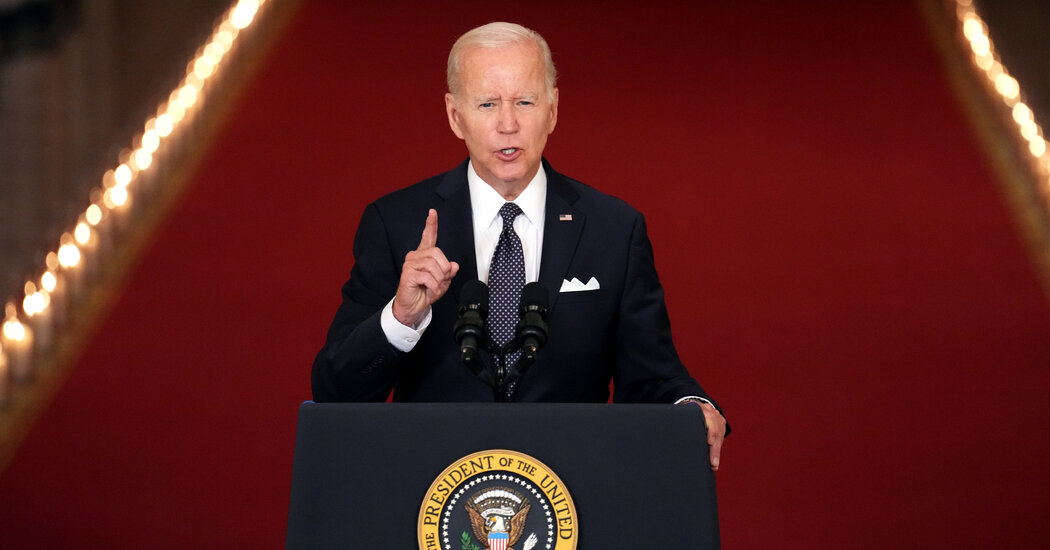
WASHINGTON — President Biden demanded on Thursday that lawmakers respond to communities turned into “killing fields” by passing far-reaching limits on guns, calling on Congress to ban assault-style weapons, expand background checks and pass “red flag” laws after massacres in Texas and New York.
In a rare evening address to the nation, Mr. Biden dared Republicans to ignore the repeated convulsions of anger and grief from gun violence by continuing to block gun measures supported by large majorities in both parties, and even among gun owners.
“My God,” he declared from the Cross Hall, a ceremonial part of the White House residence, which was lined with candles in honor of victims of gun violence. “The fact that the majority of the Senate Republicans don’t want any of these proposals, even to be debated or come up for a vote, I find unconscionable. We can’t fail the American people again.”
Mr. Biden’s speech came a day after a mass shooting in Tulsa, Okla., that killed four victims and nine days after a massacre in Uvalde, Texas, that took the lives of 19 elementary school children and two teachers. Ten days before that, 10 Black people were gunned down in a grocery store in Buffalo. The list, Mr. Biden said, goes on.
“After Columbine, after Sandy Hook, after Charleston, after Orlando, after Las Vegas, after Parkland — nothing has been done,” he said, lamenting decades of inaction.
With the 17-minute address, Mr. Biden abruptly shed the reluctance of his White House to engage in what could become yet another fruitless partisan confrontation, played out amid funerals in Uvalde, Buffalo and Tulsa. After weeks of carefully calibrating his calls for action, the president on Thursday did not hold back.
“Enough, enough. It’s time for each of us to do our part,” he told Americans. “For the children we’ve lost. For the children we can save. For the nation we love.”
“Let’s hear the call and the cry,” he said, almost pleading with his fellow politicians in Washington. “Let’s meet the moment. Let us finally do something.”
Whether that will happen remains unclear. Despite his forceful tone, Mr. Biden all but acknowledged in his speech the political realities that could make him just another in a long line of presidents to have demanded action on guns, only to fail. He called the fight “hard,” and moments after urging a ban on assault weapons, he offered alternatives if that proved to be impossible.
“If we can’t ban assault weapons, then we should raise the age to purchase them from 18 to 21, strengthen the background checks,” he said. He called on Congress to “enact safe storage law and red flag laws, repeal the immunity that protects gun manufacturers from liability, address the mental health crisis.”
In his remarks, Mr. Biden turned his evident cynicism about Republicans into a kind of political threat, saying that “if Congress fails, I believe this time a majority of the American people won’t give up either. I believe the majority of you will act to turn your outrage into making this issue central to your vote.”
Mr. Biden is not a newcomer to the gun debate.
He has repeatedly said he favors reinstating the ban on assault weapons that he helped pass as a senator and was law for a decade before it expired in 2004. He has called on lawmakers to pass universal background checks for a decade, since 20 children were killed in a shooting in Newtown, Conn., in 2012.
But both of those measures are seen as highly unlikely to pass in Congress, where fierce Republican opposition has historically stood in their way. Lawmakers in both parties have said recently that they do not believe there is enough bipartisan support to approve either approach.
House Democrats on Thursday advanced a wide-ranging package of gun control legislation that would prohibit the sale of semiautomatic rifles to people under 21 and ban the sale of magazines that hold more than 10 rounds of ammunition. But those measures, too, were all but certain to die in the Senate.
Democrats put forward the legislation in response to the killings in Uvalde and the racist massacre in Buffalo — both, the police say, at the hands of 18-year-old gunmen using legally purchased AR-15-style weapons.
A bitterly divided House Judiciary Committee spent Thursday considering the legislation and approved it Thursday evening, on a party-line vote of 25 to 19. Fierce Republican opposition during the committee debate underscored the partisan animosity.
Representative Jerrold Nadler, Democrat of New York and the chairman of the Judiciary Committee, warned that another shooting was not far away. He pleaded with Republicans, “My friends, what the hell are you waiting for?”
Republicans deride such measures as unconstitutional attempts to take guns from law-abiding Americans, robbing them of their right to defend themselves. Representative Dan Bishop, Republican of North Carolina, expressed outrage that Democrats had painted Republicans as complicit in mass shootings, declaring, “You are not going to bully your way into stripping Americans of fundamental rights.”
Karine Jean-Pierre, the White House press secretary, said administration officials had been in close touch with lawmakers over the past several days as a bipartisan group of senators discussed a narrower set of limits on gun ownership.
The negotiations have centered on expanding background checks and providing incentives for states to pass red flag laws, which allow guns to be seized from dangerous people. The group is also looking at proposals on the safe storage of guns at home, community violence and mental health, according to aides and senators involved in the talks.
With Republicans unanimously opposed to most major gun control measures, the Senate talks offer what is probably the best chance at finding a bipartisan compromise on guns that could pass the 50-to-50 Senate, where 60 votes are needed to break a filibuster and bring legislation to a vote.
But the endeavor faces long odds, with little evidence that either side is willing to give ground on a debate that has been stalled for years.
Senator Christopher S. Murphy of Connecticut is leading the talks for Democrats, joined by his fellow party members Richard Blumenthal of Connecticut, Kyrsten Sinema of Arizona, Joe Manchin III of West Virginia and Martin Heinrich of New Mexico. The Republican senators they are huddling with include Lindsey Graham of South Carolina, Patrick J. Toomey of Pennsylvania, Bill Cassidy of Louisiana and Susan Collins of Maine.
Those nine negotiators met over Zoom on Wednesday to discuss their progress, convening for an hour after days of individual phone calls and smaller meetings with each other and their colleagues. Talks were expected to continue before the Senate returns early next week.
“We are making rapid progress toward a common-sense package that could garner support from both Republicans and Democrats,” Ms. Collins said in a brief statement after the meeting.
Senator John Cornyn of Texas, a top ally to Senator Mitch McConnell of Kentucky, the Republican leader, has also been involved in discussions, including a Tuesday meeting with Mr. Murphy, Ms. Sinema and Senator Thom Tillis, Republican of North Carolina.
Democratic leaders have warned that if an agreement cannot be reached quickly, they will force votes on the bills in the House, which do not have Republican support, to demonstrate for Americans which lawmakers are standing in the way of passing gun safety measures.
“I’m cleareyed about the history of failure,” Mr. Blumenthal said in an interview after Wednesday’s meeting. “But if there’s ever a moment to put up or shut up, this one is it.”
In the days immediately after the Buffalo and Uvalde shootings, both the president and Vice President Kamala Harris largely stayed away from any direct negotiations with lawmakers about how to create a response to the shootings that can pass in Congress.
But on Thursday, Mr. Biden abandoned that approach, deciding instead to lay down a marker that will cement his legacy as a president who fought for tougher gun laws, successful or not.
In his speech on Thursday, Mr. Biden described the deep grief that he experienced when he and his wife talked to the families of victims in the two mass shootings.
“At both places, we spent hours with hundreds of family members, who were broken, whose lives will never be the same,” he said. “They had one message for all of us: Do something. Just do something. For God’s sake, do something.”
“How much more carnage are we willing to accept?” he asked. “How many more innocent American lives must be taken before we say: Enough. Enough.”
And he made the target of his comment clear, saying it now falls to Congress to pass the far-reaching laws it has refused to in the past.
“The question now is: What will the Congress do?” he said. The president said he supported the efforts by the bipartisan group in the Senate to find a compromise, but called it the least lawmakers should do.
The approach Thursday night was more like the response from former President Barack Obama in January 2013, just weeks after the shooting at the school in Newtown.
Mr. Obama, flanked by Mr. Biden, who was then the vice president, proposed a package of gun control measures, including: ensuring that all gun owners go through a background check; improving state reporting of criminals and the mentally ill; banning assault weapons; and capping magazine clip capacity at 10 bullets.
In the face of Republican opposition, Mr. Obama dropped his demand for an assault weapon ban and limits on the size of magazine clips. After months of pushing by Mr. Obama and Mr. Biden, the Senate rejected a bipartisan effort to expand background checks.
In scathing comments after the bill died, Mr. Obama derided senators for deciding that the lives of children were not worth the effort to pass legislation. A decade later, Mr. Obama’s grim assessment stands as a warning for Mr. Biden of what might happen again.
“All in all,” Mr. Obama said at the time, “this was a pretty shameful day for Washington.”
Emily Cochrane, Catie Edmondson and Zolan Kanno-Youngs contributed reporting.




